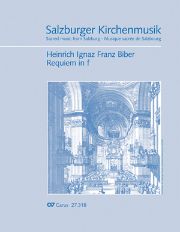Requiem for Unknown
It is not clear for whom Heinrich Ignaz Biber wrote his "smaller" Requiem setting. But its high quality is.

The fact that Guido Adler decided in 1923 to edit the smaller of Heinrich Ignaz Biber's two Requiem settings, the Requiem in f, The reason why he decided on the "Cave" - both were available to him in the Salzburg Cathedral Archive - may be due to its outstanding musical quality.
The work for five vocal parts (two sopranos, alto, tenor, bass), two violins, three violas, three trombones ad libitum and basso continuo was composed after 1692. The five-part choral writing is reinforced by a string section dominated by the violas and three colla parte trombones, which lends the work a dark timbre. In the ripieno sections, the first violin is not played colla parte. Biber allows it to shine as an independent voice above the vocal writing. In formal terms, Biber follows the usual genre traditions of southern German-Austrian church music. The composition could possibly have been intended for the funeral of a high-ranking personage from Salzburg, but no further details have been found.
The Introit is designed in four parts, the Offertory has five sections. It begins darkly Sanctus with reduced intervals. With the Pleni sunt the timbre turns to A flat major and rises to a radiant C major. Agnus Dei, Communio and Lux aeterna are summarized and divided into several sections according to the structure of the text.
This edition by Armin Kircher is the first to edit Biber's authentic musical text. Guido Adler also based his edition on the available source material, but, as his source-critical research showed, he made several changes to the original musical text.
A transcript of Biber's Requiem in f may have been in Michaelbeuren Abbey. The music inventory of P(ater) Edmund Sengmüller (1661-1714), a renowned music connoisseur, refers to an extensive collection of the most modern music from Salzburg at the time, including a "Requiem à 11" among Biber's works.
Heinrich Ignaz Franz Biber, Requiem in f for soli (SSATB), choir (SSATB), 2 violins, 3 violas, basso continuo, 3 trombones ad lib, edited by Armin Kircher, score, CV 27.318, € 52.50, Carus, Stuttgart 2015









